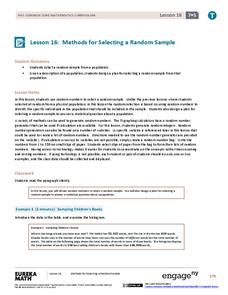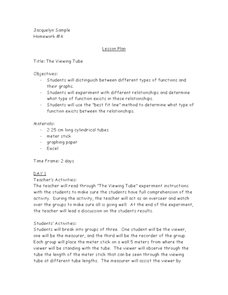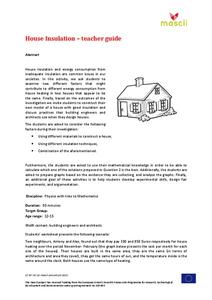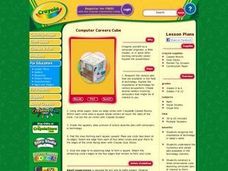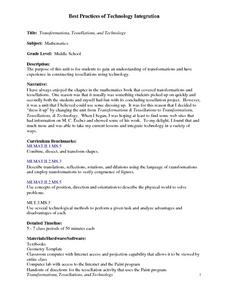Curated OER
The Energy that Keeps Us Moving
Learners measure the calorie content of food. In this technology lesson, students explore where the CEENBoTs get the energy to make it move. They create a Venn diagram showing the differences of energy in food and CEENBoTs.
Teach Engineering
Off-Road Wheelchair Challenge
Challenge your class to use their understanding of the engineering design process to design and build a small-scale, off-road prototype for an assistive technology device. Teams select materials to build their scale models, and, using...
EngageNY
Methods for Selecting a Random Sample
Random sampling is as easy as choosing numbers. Teams use random numbers to create a sample of book lengths from a population of 150 books. The groups continue by developing a technique to create samples to compare from two populations...
Teach Engineering
Connect the Dots: Isometric Drawing and Coded Plans
Individuals discover how to draw cubes on triangle-dot paper. They use cubes to build structures and draw corresponding isometric drawings on dot paper in the second lesson of the series of five. The activity also introduces the concept...
Teach Engineering
Let's Take a Spin: One-Axis Rotation
Investigate the effect of one-axis rotations on geometric figures. Scholars learn to use snap cubes and the right-hand rule to draw figures after rotations about the x-, y-, or z-axes. They try their hands at examples created by the...
Teach Engineering
Egg Drop
Don't drop the ball on the resource ... drop an egg instead! A teacher-led demonstration has the class consider how to drop eggs into glasses when a tray is in the way. Hint: If you've ever seen a magician pull a tablecloth off a table,...
Curated OER
The Viewing Tube
Looking for an excellent lesson that incorporates math, science, and technology? Groups of three students use a viewing tube to perform an experiment, and discover how to organize their data into an Excel spreadsheet. This is a...
Sprite Box
Lightbot Jr 4 Coding Puzzles
Learning how to write computer code has never been so much fun! Given control of their very own robots, children create simple programs in order to solve a series of challenges and develop their problem solving skills.
Mascil Project
House Insulation
Make sure your house is warm in the winter. Pupils analyze graphs of heating costs for two similar houses and make hypotheses for why the costs differ. They then build models of houses with appropriate insulation to reduce heating costs.
Tech Museum of Innovation
Hoop Glider Design Challenge
The fourth installment of a five-part unit has young engineers designing and testing hoop gliders. They adjust the ratio of the front loop and back loop of the glider to determine the best design for the longest flight.
Teach Engineering
The Advantage of Machines
Show your students how to make their work easier. The first lesson in a series of 10 introduces the class to work and the way simple machines can be make work easier. The simple machines scholars can find in everyday items are...
Curated OER
Computer Careers Cube
Students use the internet to research the types of careers in technology. Using construction paper, they draw themselves in one or two of the careers they found interesting. To end the lesson, they share their drawings with the class and...
Curated OER
Making a Map of the Classroom
Students create a map of the classroom using the computer programs AppleWorks and iChat in this math-based technology lesson. Lesson extension ideas include a scavenger hunt and maps of other school buildings.
Curated OER
Mirror, Mirror on the Wall, Who Needs Math in Life at All?
Students think and talk about the ways in which they use math throughout the day. They add each way to a "math in real life" bulletin board and reflect in writing on the ways they use math.
Curated OER
Transformations, Tessellations, and Technology
Middle schoolers complete a unit about transformations and tessellations. They explore various tessellation websites, determine which shapes tessellate, complete a log about which website activities they complete, and create a...
Teach Engineering
Six Minutes of Terror
Help your class understand the design challenges when trying to land a remote spacecraft on a planet. Class members examine the provided information to understand how each component of a spacecraft is designed in order to safely land a...
Teach Engineering
The Amazing Red Planet
Introduce your class to Mars with a resource that provides information about its size, location, length of day, length of year, number of moons, and average temperature. Also includes is information about the lans for past...
Teach Engineering
Airplanes Everywhere: Land! Water! Sky! Oh, My!
How important is aviation? Using the background information, teachers provide the class with a brief history of aviation. The class discusses how airplanes are important to the area of transportation in the 17th installment of a...
Teach Engineering
The Building Blocks of Matter
Everything can be reduced to atoms. The first installment of a six-part Mixtures and Solutions unit focuses on the building blocks of matter. Scholars review basic atomic structure, including protons, neutrons, and electrons, in...
Teach Engineering
May the Force Be with You: Weight
Too much material will weigh you down. The sixth segment in a series of 22 highlights how weight affects a plane. Pupils learn that engineers take the properties of materials, including weight, when designing something.
Teach Engineering
Applications of Linear Functions
It's not so straightforward — lines can model a variety of applications. Pupils experience linear relationships within the context of science, including Hooke's and Ohm's Laws. Class members got a taste of motion and speed from the...
Teach Engineering
Manned Mission to Mars
To go or to not to go — the question for a mission to Mars. This resource provides details for a possible manned mission to Mars. Details include a launch schedule, what life would be like on the surface, and how the astronauts would...
Teach Engineering
Properties of Mixtures vs. Solutions: Mix It Up!
Now it becomes crystal clear why the unit is called Mixtures and Solutions. The fifth installment of a six-part unit explores mixtures and solutions. After viewing a demonstration on mixing pebbles with water, salt with water, and...
Teach Engineering
Photosynthesis—Life's Primary Energy Source
Wouldn't it be great if you could produce your own food? Scholars learn about the processes of photosynthesis and cellular respiration in plants. They consider how to use photosynthesis as a model of an efficient system and how to apply...


